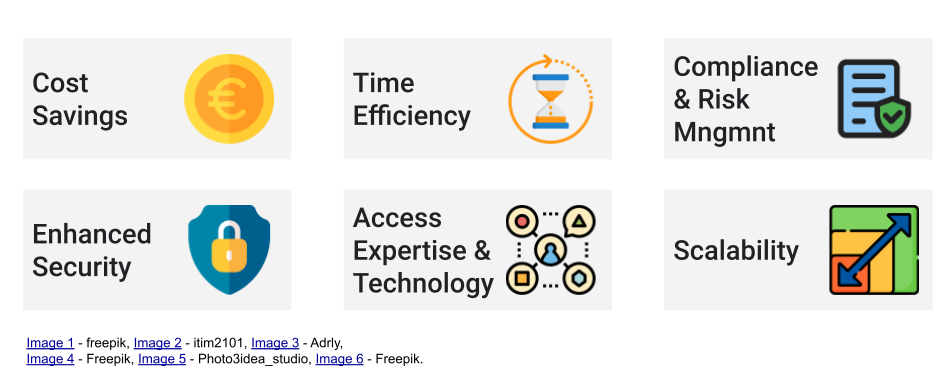Introduction
As businesses grow and evolve, managing payroll in-house can become increasingly risky, complex and time-consuming. Outsourcing payroll is a viable solution that allows businesses to leverage external expertise, ensuring accuracy, compliance, and cost-effectiveness.
Outsourcing also reduces dependency on individual team members.
This guide aims to provide CEOs with a comprehensive understanding of payroll outsourcing, highlighting its benefits, key considerations, steps for successful implementation, and how to choose the right service provider. By following this guide, CEOs can make informed decisions that align with their company’s strategic goals and enhance overall business performance.
1. The Importance and Relevance of Outsourcing Payroll for CEOs and CFOs
For CEOs and CFOs, the decision to outsource payroll is not merely an operational choice but a strategic one. Effective payroll management is critical for maintaining employee satisfaction, ensuring regulatory compliance, and safeguarding the company’s reputation. By outsourcing payroll, leadership can achieve several strategic advantages:
- Enhanced Focus on Core Business Activities – Outsourcing frees up valuable time and resources, allowing HR/Finance/leadership teams to concentrate on growth, innovation, and strategic planning.
- Risk Mitigation – Professional payroll providers are compliance experts and can significantly reduce the risk of costly errors, penalties, and legal issues. They also mitigate the risks associated with relying on a single employee or a small team.
- Cost Efficiency – Outsourcing can lead to cost savings by eliminating the need for a dedicated in-house payroll team and reducing investment in payroll software and infrastructure. CFOs can appreciate the shift from fixed costs to variable costs, enhancing financial flexibility, and allowing for better allocation of resources.
- Scalability – As the company expands, outsourced payroll services can easily scale to meet increasing demands without the need for additional internal resources. This allows both CEOs and CFOs to focus on strategic growth and market expansion without the worry of payroll management keeping pace.
In an era where agility and efficiency are paramount, outsourcing payroll provides a competitive edge. CEOs and CFOs must understand the full spectrum of benefits and considerations to make informed decisions that align with their company’s long-term strategic goals.
2. Understanding Payroll Outsourcing
What is Payroll Outsourcing?
Payroll outsourcing is the process of hiring an external organisation to handle all payroll-related functions for your company. This can include calculating employee wages, managing & paying tax withholdings, handling benefits administration, and ensuring compliance with employment laws and regulations.
Outsourcing payroll allows companies to leverage the expertise of specialised providers, ensuring accuracy and efficiency in payroll processing which leads to improved operational performance and employee satisfaction
Types of Payroll Services Available
There are various types of payroll services that companies can outsource, depending on their specific needs and the complexity of their payroll requirements:
- Comprehensive Payroll Services: These providers handle all aspects of payroll processing, including wage calculations, tax filings, direct deposits, and employee benefits administration..#
- EOR (Employer of Record) Services / PEO (Professional Employer Organisation): A PEO/EOR provides comprehensive HR outsourcing solutions, including payroll management. They act as a co-employer, sharing responsibilities and liabilities, which can be particularly beneficial for small to medium-sized businesses by providing added support and risk management.
- Specialised Payroll Services: These providers focus on specific aspects of payroll, such as leadership/management payroll, tax filing, or T&A. They cater to businesses with unique requirements or those operating in specialised industries offering tailored solutions to meet specific operational demands.
Understanding the different types of payroll services available helps CEOs & CFOs make informed decisions about which outsourcing option best aligns with their company’s needs. Each type offers distinct advantages, and the choice depends on factors such as company size, industry, and the complexity of payroll operations.
PayrollMalta provides all the above mentioned payroll services.
3. Benefits of Outsourcing Payroll
There are a number of advantages associated with outsourcing payroll

Cost Savings
Outsourcing payroll can lead to significant cost savings for businesses. Maintaining an in-house payroll department involves expenses related to salaries, benefits, training, software, and infrastructure. By outsourcing, companies can convert these fixed costs into variable costs, paying only for the services they need. This can be particularly beneficial for small to medium-sized businesses that do not have the resources to maintain a full-fledged payroll department.
Time Efficiency
Processing payroll internally can be time-consuming, especially for companies with a large workforce or complex pay structures. Outsourcing payroll frees up valuable time for HR and finance teams, allowing them to focus on strategic initiatives that drive business growth. Given their scale, payroll providers have optimised operations that effectively handle tasks, ensuring payroll is processed accurately and on time.
Compliance and Risk Management
Payroll regulations are intricate and continually evolving. Non-compliance can result in hefty fines and legal penalties. The CfR does not provide statements of non compliance. Filers must request these to confirm that a tax filing period is closed with no discrepancies.
Professional payroll service providers stay up-to-date with the latest laws and regulations ensuring that your company remains compliant. They handle tax filings, reporting requirements, and other regulatory obligations, reducing the risk of errors and legal issues.
Enhanced Security
Payroll processing involves handling sensitive employee information, making robust security measures essential. Professional payroll providers employ advanced security protocols, including ISO-certified processes, to safeguard this data. This level of security is often beyond what SMBs can achieve independently as they typically lack ISO-certified payroll departments.
Access to Expertise and Technology
Outsourcing payroll gives companies access to advanced technology and expertise that may not be available in-house. Payroll providers invest in state-of-the-art software and employ specialists who are well-versed in payroll management and employment law. This ensures accuracy, efficiency, and the ability to handle complex payroll scenarios, such as multi-state or international payroll. Payroll providers also utilise systems that integrate with HR software, facilitating seamless technology access.
Scalability
As companies grow, their payroll needs become more complex. Outsourcing payroll provides the flexibility to scale services according to the company’s changing needs. Whether you are expanding your workforce, entering new markets, or acquiring other businesses, outsourced payroll services can easily adapt to meet increased demands without the burden of additional internal resources.
In summary, outsourcing payroll provides several benefits that enhance operational efficiency, ensure regulatory compliance and support strategic goals. By recognising these advantages, CEOs can make informed decisions that drive the overall success of their organisation.
4. Key Considerations Before Outsourcing
Assessing Your Company’s Needs
Before deciding to outsource payroll, it is essential to assess your company’s specific needs and current payroll processes. Consider these questions:
- What are the primary challenges you face with your current payroll system?
- How complex is your payroll structure (e.g., number of employees, type of employment contracts, multiple locations)?
- What are your objectives for outsourcing (e.g., cost reduction, compliance, scalability)?
By addressing these points, you can make a more informed decision about whether outsourcing is the right move for your organization.
Evaluating Potential Providers
Choosing the right payroll service provider is critical to the success of outsourcing. Evaluate potential providers based on the following criteria:
- Experience and Expertise – Look for providers with a proven track record in your industry and the expertise to manage your specific payroll needs effectively.
- Service Offerings – Ensure the provider offers a full range of services that align with your requirements, such as tax filing, compliance management, and employee self-service portals.
- Technology – Assess the provider’s technology stack. Advanced software solutions can streamline payroll processes and provide valuable insights through analytics.
- Customer Support – Reliable customer support is essential. Ensure the provider offers robust support channels and has a reputation for responsive and effective service. Checking Google reviews can provide valuable insights into their service quality.
Security and Confidentiality Concerns
Payroll involves managing sensitive employee data, making security and confidentiality essential priorities. When evaluating providers, consider the following:
- Data Security – Ensure the provider uses robust security measures such as encryption, secure access controls, and regular security audits.
- Compliance – Verify that the provider complies with relevant data protection regulations, such as GDPR (General Data Protection Regulation) for companies operating in Europe. Verify that the provider is ISO certified.
- Confidentiality Agreements – Establish clear confidentiality agreements to protect employee information and outline data handling procedures.
Integration with Existing Systems
Smooth integration with your existing systems is essential to avoid disruptions and ensure efficiency. Consider:
- Compatibility – Ensure the payroll provider’s systems are compatible with your existing HR and accounting software.
- Data Migration – Plan for data migration, ensuring that historical payroll data is accurately transferred to the new system.
- Process Integration – Work with the provider to integrate payroll processes seamlessly with other business functions, such as time and attendance tracking, benefits administration, and financial reporting.
Data migration might not be necessary if the service provider can use your own payroll software.
Cost Analysis
Conduct a comprehensive cost analysis to understand the financial implications of outsourcing payroll. Compare the expenses of maintaining an in-house payroll department, including salaries, software, and infrastructure, with the fees charged by external providers to identify potential cost savings. Consider:
- Upfront and Ongoing Costs – Include setup fees, subscription costs, and any additional charges for specific services.
- Hidden Costs – Be aware of potential hidden costs, such as charges for additional support or customisation.
PayrollMalta adopts a transparent pricing policy, ensuring predictable billing. Simple additional tasks incur no charges, while any exceptional requests are quoted beforehand for client approval.
Establishing Key Performance Indicators (KPIs)
Define clear KPIs to measure the success of your payroll outsourcing initiative. These could include:
- Accuracy – Track error rates in payroll processing.
- Timeliness – Monitor the punctuality of payroll disbursements.
- Compliance – Measure adherence to regulatory requirements.
- Employee Satisfaction – Gauge employee satisfaction with payroll services through regular surveys.
Communication and Change Management
Effective communication and change management are essential for a smooth transition to outsourced payroll. Consider:
- Employee Communication – Inform employees about the introduction of a payroll provider, explaining the benefits and addressing any concerns.
- Training – In cases where software needs to be changed, provide training for HR and finance staff on how to use the new payroll system.
- Feedback Mechanisms – Establish channels for employees and managers to provide feedback on the new payroll processes.
By carefully considering these factors, CEOs & CFOs can ensure a successful transition to outsourced payroll, maximising the benefits while minimising potential risks and disruptions.
5. Steps to Successfully Outsource Payroll
Creating a Transition Plan
A detailed transition plan is essential for a smooth shift to outsourced payroll. Key elements of a transition plan include:
- Timeline – Establish a realistic timeline for the transition, including key milestones and deadlines.
- Stakeholder Involvement – Identify all stakeholders (HR, finance, IT, and employees) and ensure their involvement in the planning process.
- Responsibilities – Define the roles and responsibilities of both your internal team and the payroll provider during the transition.
Regular Monitoring and Review
Ongoing monitoring and review are essential to ensure the outsourcing arrangement continues to meet your objectives. Steps include:
- Scheduled Reviews: Conduct regular performance reviews with the payroll provider to assess service quality and address any issues.
- Feedback Loops: Establish feedback mechanisms for employees and managers to report any problems or suggestions.
- Performance Reports: Review detailed performance reports from the payroll provider, focusing on KPIs and overall service quality.
Scheduled reviews and planned feedback loops are integral to PayrollMalta’s process, ensuring we deliver impeccable service. We proudly maintain a client Net Promoter Score (NPS) of over 80, reflecting our commitment to excellence and client satisfaction.
Contingency Planning
Prepare for potential issues with a contingency plan that includes:
- Backup Processes – Ensure backup processes are established for payroll processing to mitigate risks associated with provider failures or technical issues.
- Communication Plans – Have a communication plan ready to address any disruptions with employees and stakeholders.
- Service Level Agreements (SLAs) – Ensure your contract with the payroll provider includes clear SLAs that outline response times and resolution processes for any issues.
6. Choosing the Right Payroll Service Provider
Criteria for Selection
Selecting the right payroll service provider is crucial for the success of your outsourcing initiative. Consider the following criteria:
- Experience and Reputation – Choose a provider with a strong track record and positive reputation in the industry. Look for providers who have experience handling payroll for companies of similar size and complexities.
- Range of Services – Ensure the provider offers a comprehensive suite of services that align with your company’s needs, such as tax filing, compliance management, employee self-service portals, and customised reporting.
- Technology and Integration – Assess the provider’s technology capabilities, focusing on the strength of their payroll software and their ability to integrate seamlessly with your existing HR and accounting systems.
- Customer Support – Reliable customer support is essential. Evaluate the provider’s support channels, response times, and the quality of their support services. Evaluate their Google Reviews.
- Security and Compliance – Ensure the provider has strong data security measures in place and complies with relevant standards and compliance regulations. ISO certification is essential for guaranteeing peace of mind.
Questions to Ask Potential Providers
When evaluating potential payroll service providers, ask the following questions to ensure they meet your requirements:
- What is your experience with companies in our industry and of our size?
- Can you provide references/testimonials from similar clients?
- What specific payroll services do you offer, and how do they address our needs?
- How do you ensure data security and confidentiality?
- How do you handle errors or issues, and what is your process for resolving them?
- What technology platforms do you use, and how do they integrate with existing systems?
- What are your fees, and are there any hidden costs we should be aware of?
- What kind of customer support do you provide, and what are your response times?
- How do you handle data migration and transition processes for new clients?
By carefully selecting the right payroll service provider and fostering a strong partnership, CEOs & CFOs can ensure efficient, accurate, and compliant payroll processes, ultimately supporting the overall success of their organisation.
For further information and assistance with your payroll requirements, please reach out to info@payrollmalta.com or call 2258 8019.





